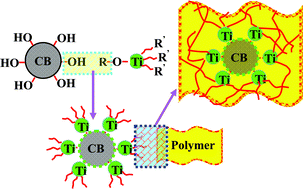Enhanced dielectric properties and positive temperature coefficient effect in the binary polymer composites with surface modified carbon black
Abstract
We report a new kind of binary

Maintenance work is planned from 09:00 BST to 12:00 BST on Saturday 28th September 2024.
During this time the performance of our website may be affected - searches may run slowly, some pages may be temporarily unavailable, and you may be unable to access content. If this happens, please try refreshing your web browser or try waiting two to three minutes before trying again.
We apologise for any inconvenience this might cause and thank you for your patience.
* Corresponding authors
a
Key Laboratory of Beijing City for Preparation and Processing of Novel Polymer Materials, Ministry of Education Key Laboratory for Nanomaterials, Beijing University of Chemical Technology, Beijing, People's Republic of China
E-mail:
dangzm@mail.buct.edu.cn
b Lab. MSSMAT, CNRS UMR 8579, Ecole Centrale de Paris, Grande Voie des Vignes, Châtenay Malabry Cedex, France
We report a new kind of binary

 Please wait while we load your content...
Something went wrong. Try again?
Please wait while we load your content...
Something went wrong. Try again?
H. Xu, Z. Dang, M. Jiang, S. Yao and J. Bai, J. Mater. Chem., 2008, 18, 229 DOI: 10.1039/B713857A
To request permission to reproduce material from this article, please go to the Copyright Clearance Center request page.
If you are an author contributing to an RSC publication, you do not need to request permission provided correct acknowledgement is given.
If you are the author of this article, you do not need to request permission to reproduce figures and diagrams provided correct acknowledgement is given. If you want to reproduce the whole article in a third-party publication (excluding your thesis/dissertation for which permission is not required) please go to the Copyright Clearance Center request page.
Read more about how to correctly acknowledge RSC content.
 Fetching data from CrossRef.
Fetching data from CrossRef.
This may take some time to load.
Loading related content
